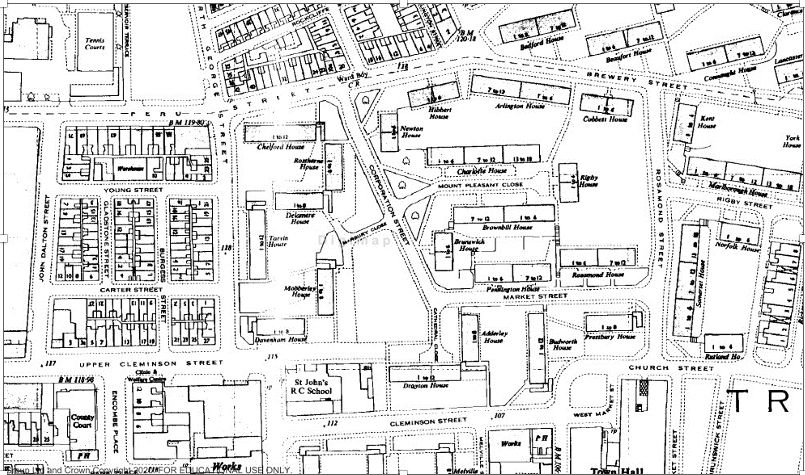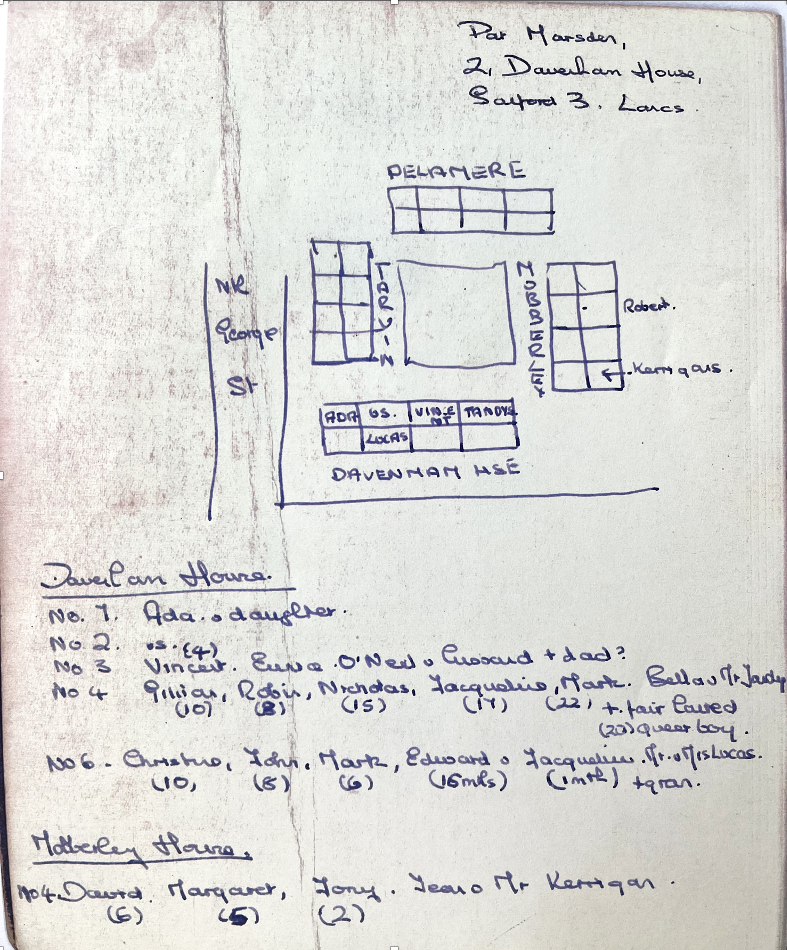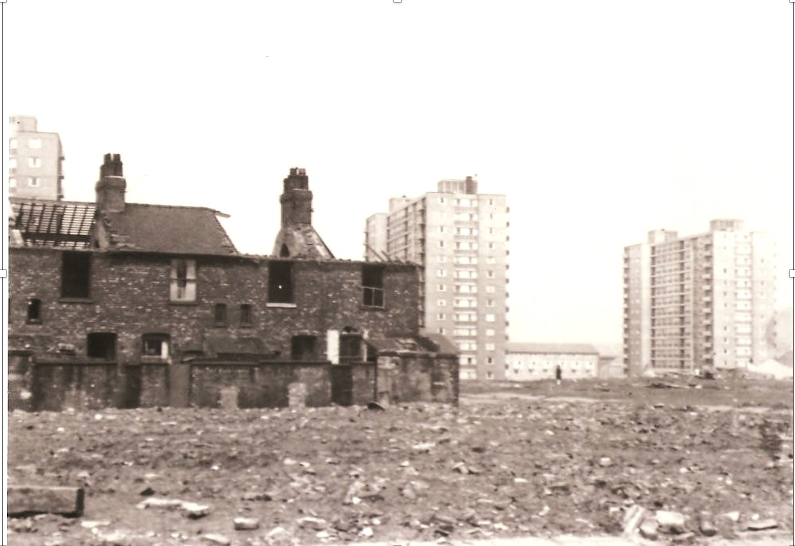by
Rosalind Edwards (University of Southampton) and Val Gillies (University of Westminster)
Rosalind Edwards is a Professor of Sociology at the University of Southampton. This blog post is related to her research that focusses on family lives and policies concerning family. It discusses a fascinating diary by Pat Marsden, wife of the sociologist Dennis Marsden.
In August 1963 the sociologist Dennis Marsden, his wife Pat and their two small children were provided with the tenancy of 2 Davenham House so that Dennis could conduct a research study of the area. Davenham House was a recently-built maisonette located in a neighbourhood of slum clearance and redevelopment in Salford 3. It formed one side of a rectangle with three other low rise maisonette blocks. The blocks were located in the Trinity Estate area, bordered by North George Street, Peru Street, and what was Corporation Street and Upper Cleminson Street (now merged as Mayan Avenue) (see Figure 1).

Dennis Marsden had been employed as a Research Fellow by the Salford Royal College of Advanced Technology (an antecedent of the University of Salford) to undertake a study of working class communities affected by the local authority policy of slum clearance and rehousing. Sociological research was regarded as providing an understanding of everyday lives towards rebuilding British post-war society. In-depth studies of the implications of disruption in a shifting landscape of neighbourhood upheaval and family relocation were part of efforts at social renewal.
Dennis kept careful and detailed records about his research, including labour mobility surveys, discussions with the local authority Planning Department, interactions with neighbours, and the concerns of the Tenants Defence League. In a report for the Salford Housing Committee, for example, he notes the implications of the ‘unneighbourly’ lack of doorknobs on the front doors of newly-built properties, which meant that people couldn’t pop in and out of each others’ homes in the way they were wont to in the slum streets.[i]
Dennis’ wife, Pat, kept a daily diary for the initial six months of their 18-month stay on the estate, handwritten in two Royal Salford College of Advanced Technology exercise books. She recorded everyday life around her, interactions with neighbours, family life, parenting and children’s lives.[ii] (See Figure 2.) We have been studying Pat Marsden’s diary as part of a research project on the contribution of sociologists’ wives to post-war British community studies, and their role in bridging community and social sciences.[iii] Pat kept her diary in the expectation that the entries would help inform her husband’s analysis, and indeed his own records often make reference to ‘see Pat’s diary’ and ‘Pat says ….’

© Marsden Estate, reproduced with agreement.
Pat’s diary contains lively descriptions of life on the local estate from her position as a wife and mother. She recorded everyday life in the flats, happening in the square outside the front window of 2 Davenham House. The diary entries include an engaged account of poor working class children’s life on the Trinity housing estate, capturing characters and activities. The children often came to the Marsden’s door to call for their son Daniel to come out to play with them, and attempt to sell items to Pat:
John, with ice-cream cornet. Came and asked for Daniel. I told him that he was having his dinner. Five minutes later back again with David and Mark. David asked this time. Think John put him up to it. Whenever John sees me at the window he rushes towards it waving and shouting ‘Hi-ya’ and peers in. Usually finds something to ask – Has now, I think been dissuaded from shouting through the letter box although he still peers through glass on door. (11th August)
David came round with a ‘sweep’ – tiny pieces of paper with numbers written on them in a Boots ‘Glycerine Suppositories’ cardboard box. Selling them for 1/2d each. I hadn’t a 1/2d so gave him 1d and said he’d have to give me two. ‘What are you going to do with the money’ I said. David didn’t know. Mark said, ‘We’re going to save ‘em and then we’ll have thousands of ha’pennies! … Later they came back from the sweet shop with ½d chews. David gave Daniel one but I told him to keep it. ‘Nobody’ll buy any of ‘em. I been round the block? Do you want ‘em. You can have ‘em for nowt if you like. Do you fink I ought to throw them away!’ I said it might be best and he did. (30th August)
Pat’s exchanges and friendships with other women on the estate were often mother-to-mother, revealing the practices and concerns of poor working class mothering and Pat’s assessments of them:
Bella came asking for two 1/-. She gave me the florin. ‘Always give the money to the woman’ she laughed. (1st September)
Went to ask Bella if she knew a good cleaners. She said that if it was anything she cared about she took it to one near to Mac. Fisheries on Deansgate. Diane’s mother was just leaving – in rollers. Bella asked me in – said she’d just been washing her curtains – pale pinkish nylon dress material at 4/11 a yard. With a frill. Each curtain was joined down the centre (36” material I suppose). The vertical edges had splayed out – she puts them in her washer and irons them wet as soon as she takes them out. (30th September)
I went round to Jean’s to recover Daniel’s bike which Tony had ‘borrowed’. We remarked on the bitter cold and I asked her round for a cup of chocolate. She checked the time first as she was expecting a clubman – (the curly haired clubman I met in Bella’s when I was in before Daniel’s party comes from Regent Rd. warehouse I think she said. Co-op??) Before she came across a neighbour who was passing offered to get her family allowance which Jean gratefully agreed to. Talked about toilet training. Tony is out of nappies but my word he could do to be in them. He just wets downs his legs and at least once has wet on my carpet and made puddles in my porch. (5th November)
The drawbacks of the built environment faced by Pat and other mothers on the Trinity Estate were recorded in her diary. Dissatisfactions included waste ground as the only playspace for children, the sharp gravel pathways, difficulties of living in one of the upper maisonettes with young children and prams, and the lack of outside space for drying clothes:
I said that it must be difficult for her mum to get up and down the stairs. ‘Yes it is. Me mam went to the housing to try and get the key for a pram shed. But they said that someone else had got it. I think Mrs Tandy’s got one but they keep a motor bike and a byke in it.’ (26th August)

© Marsden Estate, reproduced with agreement
Went shopping with mum, Daniel and Sarah. The local block kids had made an enormous bonfire – big as a small room on the waste ground outside Mobberley Court. Later on children were to be seen staggering off in the direction of the demolished area with various unweildy [sic] sections (28thAugust)
I asked if she used the airing cupboard in the kitchen. ‘Yes, well I have to. But it’s not good for big things and if you put anything woollen on it shrinks then. I’ve got a spare bedroom and I’ve rigged up a beam in there and the washing dries lovely when I have the window open. (1st September)
Daniel fell and cut his knees badly on the red shale. I wish they’d find some money to pave it or tarmac it. (6th September)
Most of these restrictions and hazards found their way into Dennis Marsden’s report and recommendations for improvements to the Salford Housing Department.
[i] Dennis Marsden’s research material is lodged in the special collections archive at the University of Essex: Marsden, D. Salford Slum and Rehousing Study, 1963-1964 [unprocessed study]. Colchester, Essex: UK Data Archive [distributor], SN: 6225. The collection includes the Salford Royal College of Advanced Technology – Work and Housing Project: A second report prepared for SALFORD HOUSING COMMITTEE by the Research Fellow of the Liberal Studies Department at the Royal College. The Salford Slum and Rehousing Study was unpublished.
[ii] A transcript and images of the diary are lodged with the Library Archive at the University of Salford. They form a valuable record of the university’s connection with the local area and also are of interest for urban, working class and family history researchers.
[iii] We are grateful to the British Academy/Leverhulme small grants scheme for funding our study: ‘Wives’ role in pioneering classic community studies: the Bethnal Green and Salford Diaries’, SG2122/210026.
If you would like to receive notifications of new blog posts email ‘SUBSCRIBE’ to themodernbackdrop@salford.ac.uk
We are interested in what you have to say about our posts. Please use the comment box below. Comments in our blogs and material sent to us will be displayed anonymously in an exhibition at Salford Museum and published in an exhibition catalogue.
We are also collecting personal memories, photographs, postcards, letters etc. from people who remember the daily life in Salford during the 1950s, 60s and 70s. If you would like to share a memory or a family photograph, please contact us: themodernbackdrop@salford.ac.uk
What a wonderful record of the times. Enjoyed reading this article. Brought back many memories.
Thank you.
Ros
Bella was my Nana